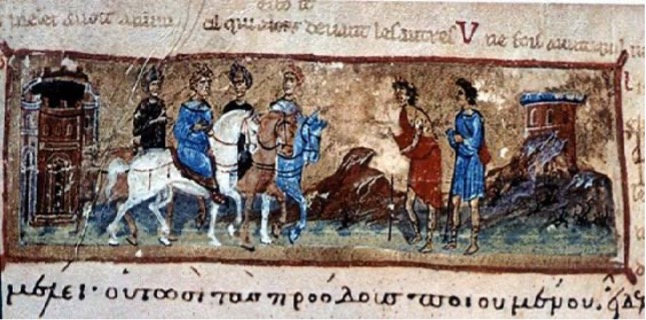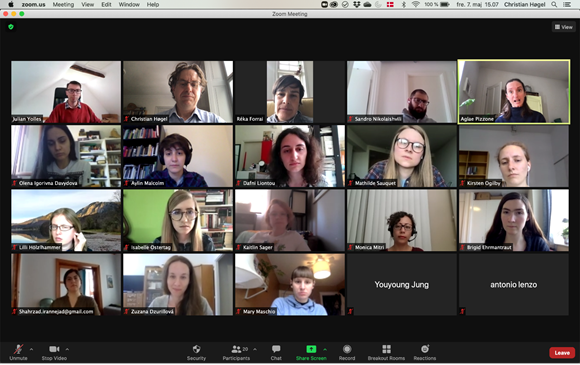
Medieval Literature Across Languages: A Multilingual Summer School
Julian Yolles and Christian Høgel write about the Summer School which took place online in May 2021.
Medieval Literature Across Languages: A Multilingual Summer School
17-28 May 2021
Organizers: Julian Yolles and Christian Høgel
Instructors: Aglae Pizzone (Greek), Christian Høgel (Georgian), Julian Yolles (Arabic), Réka Forrai (Latin), and Sandro Nikolaishvili (Georgian), with lectures by Joel Kalvesmaki, Lars Boje Mortensen, and Stratis Papaioannou
This summer school, organized by the Retracing Connections project and the Centre for Medieval Literature, provided 27 PhD students from around the world with a first immersion into the study of medieval literature across Arabic, Georgian, Greek, and Latin languages. Originally planned to take place in person at the Swedish Research Institute in Istanbul, the summer school was moved to an online format following the global travel restrictions.
The summer school, which met for 3 hours a day, was divided between language lessons, tutoring, and lectures. In all three components, the central focus was on the Barlaam and Josaphat narrative—loosely based on the story of the Buddha—, which was adapted across medieval Eurasia into numerous languages. Participants in the summer school, who were required to have a working knowledge of one of the summer school languages, were thus able to leverage their knowledge of one medieval language in learning another. 
In the language lessons, the online format worked to enhance this multilingual approach to literature, as digital parallel-text editions of selected corresponding passages (produced by Julian Yolles) enabled students to begin reading a text almost immediately and to reflect on the changes that occur from version to version. To get those studying languages in non-Latin alphabets (Arabic, Georgian, Greek) up to speed, preliminary online lessons and exercises were provided to participants beforehand.
The multilingual instruction was reinforced by a peer tutoring system. Each participant was responsible for providing a small amount of tutoring in one of the summer school languages they had already studied. To ensure that everyone had a chance to both offer and receive tutoring, participants were divided into tutoring blocks, during which they alternately offered assistance to their peers in breakout sessions on Zoom or had the opportunity to log on and ask questions. During these sessions, participants learned to make new connections across languages and literatures.
Lectures offered participants the opportunity to engage with cutting-edge research on topics relevant to the summer school. Christian Høgel delivered lectures on the development of the Barlaam and Josaphat narrative during the Middle Ages, as well as on the earliest Greek translation of the Qur’an. Lars Boje Mortensen offered insights on the methodological challenges and opportunities of studying literatures belonging to different linguistic and scholarly traditions, with a case study on the Alexander romance in Latin, German, and French. Stratis Papaioannou’s lecture on the Life of Theodore of Edessa showed how Georgian, Greek, and Arabic were intimately connected at the Iviron monastery on Mt Athos in the time of its abbot Euthymios the Georgian (who likely authored the Greek version of the Barlaam and Josaphat narrative). Finally, Joel Kalvesmaki gave participants a crash course in two sessions on producing parallel digital text editions in different languages using XML and his own XML-based Text Alignment Network, which was used to produce the parallel Barlaam and Josaphat selections for the summer school.
Apart from helping PhD students on their way to acquiring new medieval languages, the summer school proved a wonderful opportunity for discussions on what translations and versions mean, what working in multilingual milieus could have been like in the Middle Ages, and what could make a story like that of Barlaam and Josaphat travel so widely. Close studies are required to answer such questions, but with a little help and with the energy provided by the participants, we all got within reach of answering these during the two weeks – even in the context of newly acquired languages.